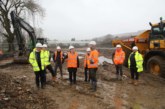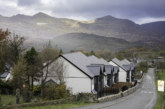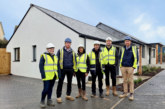Glebe Farm School and Inspiring Futures through Learning win Environmental and Sustainability Award.
“Our winner is delivering today a glimpse of what the future of all schools could and should be into the 21st century and beyond.”
This was the feedback from judges of the 2023 Milton Keynes Education Awards as Glebe Farm School and Inspiring Futures through Learning (IFtL) scooped the Environmental and Sustainability Award on the 22nd September.
The Environmental and Sustainability Award, one of 11 categories, sought to “recognise an individual or a team that is on a mission to save the planet, someone who is engaging students and members of school staff in their mission and who is inspiring positive change in the school community and beyond”.
In a ceremony at the Double Tree by Hilton in Milton Keynes, hosted at Eamonn Homes, Glebe Farm School and IFtL beat off fierce competition to win the award for their “flagship environmental and sustainability initiative”.
Glebe Farm School, which opened its doors in September 2022, is an all-through school where children can enter at reception and stay all the way through to Year 11. There is also a 39-place full-time equivalent nursery.
The whole site is designed to have a minimal impact on the environment. Glebe Farm School is gas free, with air source heat pumps (ASHPs) used instead. The ASHP system is set up to provide continued heating and hot water if any of the units fail — there are five systems in total — and there is no back-up access to fossil fuels. All lighting comes from ultra-efficient LEDs whilst hundreds of solar panels generate power.
Energy-saving technology such as zero carbon site hoarding and an onsite solar powered generator were employed during the build by Morgan Sindall Construction, minimising any impacts on the local environment. In the school’s grounds, 840 saplings donated by The Woodland Trust have been planted. All mulch and topsoil have been reused and the levels of the ground carefully redesigned and raised to accommodate this additional material. In operation, this now saves 40 tonnes of CO2 each year.
The school’s approach to the involvement, and learning, of staff and students around environmental sustainability was also a focus of the nomination. It has embedded a code of conduct called “The Glebe Way”, which sets out a list of behaviours and responsibilities that it expects all pupils to follow to build on the environmental ethos of the school, include environmental and social responsibility as well as pupils taking responsibility for their learning.
Each house within the school is named after a current or historical figure felt to reflect that ethos, from Tessa Khan to David Attenborough and Greta Thunberg. These well-known figures were chosen not only for their environmental acumen and influence but also for the broader values that their stories and lives may inspire in Glebe’s young pupils. There is even a bike installed on campus that can children can pedal to add energy to the school grid, so they understand how that energy is developed.
In collecting the award with colleagues from Glebe Farm, IFtL CEO Sarah Bennett said: “We are so pleased to win this Environmental and Sustainability Award. Having worked in education for over 30 years, I honestly can say that children have never been more aware of their global environment than they are today. The impact of our actions on our planet are highly visible and our collective responsibilities to ensure sustainability and an action-focused approach throughout society, now and into the future, have never been more important.
“In Milton Keynes, this agenda is as high in profile as anywhere in the country. We see this in the MK Sustainability Strategy 2019-2050, which includes a commitment to the ambition of Milton Keynes becoming carbon neutral by 2030 and carbon negative by 2050, and since 2015 Milton Keyes City Council has opened around half a dozen new schools and expanded over 20 others in the area. In each case planners, architects and builders have aimed to have a positive impact on the environment by using clever designs and greener technologies.
“Our work on Glebe Farm School is a great example. The build itself was designed to be inspirational and a key part of the strategies of IFtL and Milton Keynes City Council in working towards school estates that practically demonstrate environmental sustainability. However, our responsibilities to the environment are also reflected and embedded in our curriculum and learning, not just our everyday practice and use of resources.
“At IFtL we understand, and are committed to, our responsibility in shaping and influencing the lives of future generations. We do this in partnership with our families, our communities, fellow educators, and other, essential, local partners. A massive thank you to everyone who has helped to make Glebe Farm School our flagship environmental and sustainability initiative and a genuine drive for change for the future of our children.”
The judges also wrote: “From the thoroughness of its concept and build, through to the delivery of its values and outputs, the judges were impressed by the comprehensive scale of this scheme, the first fossil fuel free school in the UK.”
Glebe Farm School was also shortlisted for the Primary School of the Year and Secondary School of the Year categories, whilst Matthew Shotton made the final five for the Headteacher of the Year award.
Header image: Eammon Holmes, Sarah Bennett, Jason Smith (Head of Operations IFtL) and Mark Dolling (Trustee IFtL).










